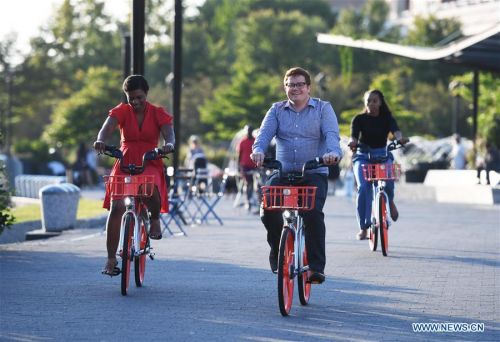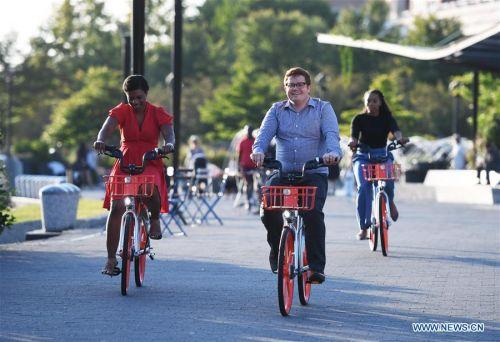
People ride bikes of Chinese bike-sharing giant Mobike in Washington D.C., the United States, Sept. 20, 2017. Chinese bike-sharing giant Mobike launched its service here on Wednesday, marking its U.S. debut amid a rapid global expansion. (Xinhua/Yin Bogu)
WASHINGTON, Sept. 20 (Xinhua) -- It is common to see commuters and visitors riding a black-and-red Capital Bikeshare bicycle shuttling on the streets in the U.S. capital of Washington D.C. -- now they have an orange-and-silver alternative provided by Chinese bike-sharing company Mobike.
"It is much less lighter and it is so good to ride," local resident Crystal Davis told Xinhua after riding a Mobike bicycle along the eastern riverbank of Potomac River near the Washington Harbor.
She was among the first users of the Chinese bike-sharing service, which was officially launched in Washington D.C. on Wednesday, aiming to make people's first- and last-mile connections easier.
Different from the kiosk-centered Capital Bikeshare program, Mobike has an advantage that it uses a dockless system that allows users to park their ride wherever it's legal for bike parking, said Luke Schoen, the company's senior manager of international communications.
It is even more convenient that cyclists are able to register, locate, unlock and pay for the ride all with the Mobike app. "Everything is done through the app on your mobile phone so it is a convenient experience and seamless," said Hu Weiwei, co-founder and president of Mobike.
To fit into the U.S. markets, Mobike improves its bikes by adding a three-gear shifting system, a solar panel that powers its in-built GPS, and a pedals-powered front light, besides its signature rubber, puncture-proof tires.
Officially launching its service in Shanghai in April last year, Mobike has since expanded its presence to 180 cities worldwide, including some cities in Thailand, Malaysia and Britain, with over 5 million bikes.
The company, which has first deployed about 200 bikes in Washington D.C., chose the city to start its U.S. foray for a spate of reasons, including a flat terrain in most areas, bike-friendly culture, and an innovative-thinking government that welcomed the Chinese bike-sharing company as the city's first dockless bike-sharing program.
City officials said it would be a flexible way to expand the capacity of the city's bike-share program when Capital Bikeshare, which has roughly 3,700 bikes at 440 racks, is maxed out. Mobike offers one U.S. dollar for a 30-minute ride, half the price for the same trip using Capital Bikeshare.
Spin and LimeBike, two U.S.-based startups, are also eyeing the market as the city has the second-highest share of bike commuters in the country, after Portland in the state of Oregon.
But there is currently no regulatory framework for operations of dockless bike service in Washington D.C. where transportation officials give six months to allow operators to test their service and work out rules to address commonly-seen problems brought about by bike-sharing programs, including clogged sidewalks and streets.
Schoen said the company is likely to use red packets (coupons), or Hongbao in Chinese, a traditional Chinese way of offering incentives, to encourage users to park the bikes in authorized areas or bring them from remote places into a central circulation.
Mobike is also working to address such concerns to convince the authorities that dockless bike-sharing is a reasonable and reliable transportation option.
"Mobike is committed to developing a global bike-sharing culture by collaborating closely with cities," said Hu. "The U.S. capital is key in achieving this." Enditem




 A single purchase
A single purchase









